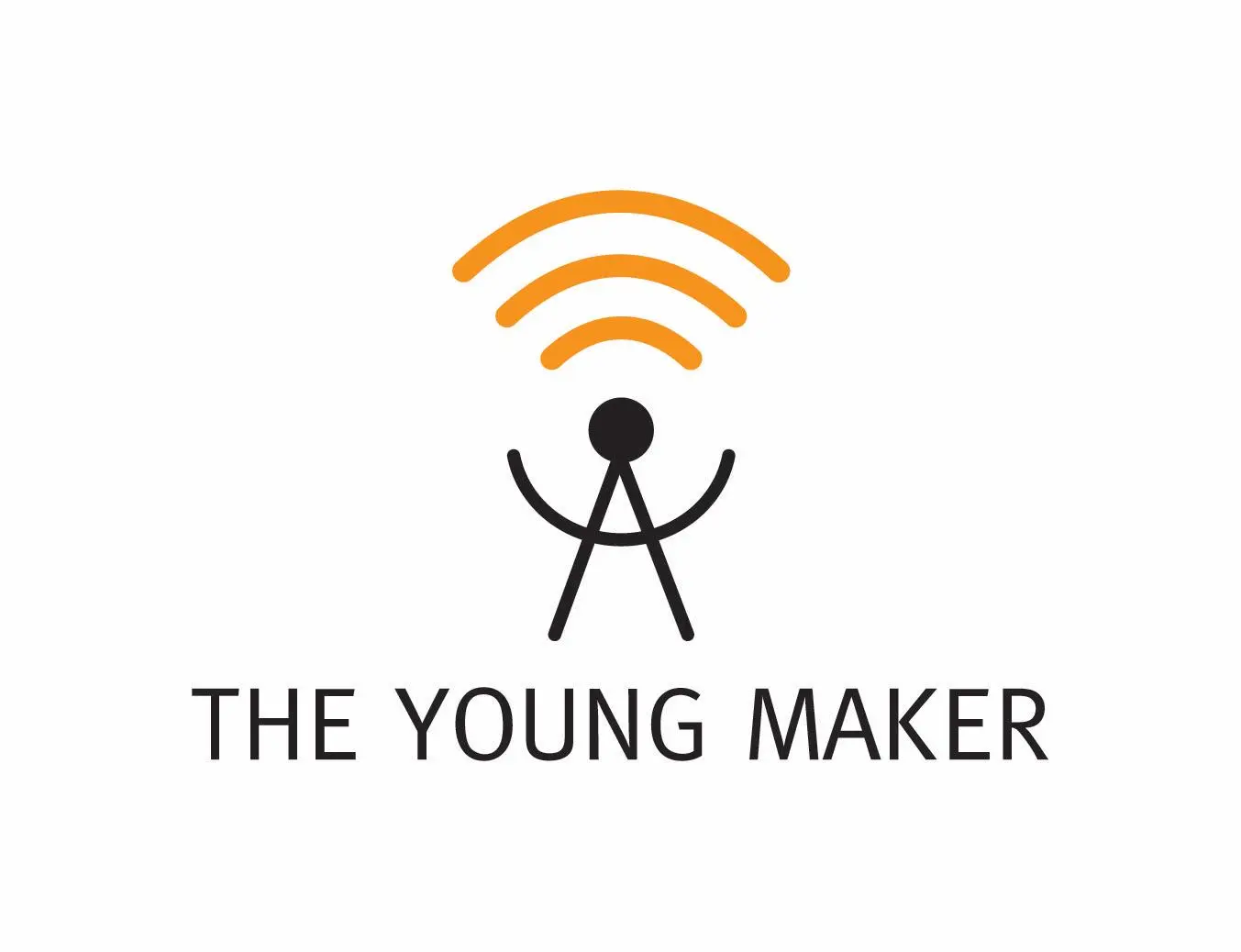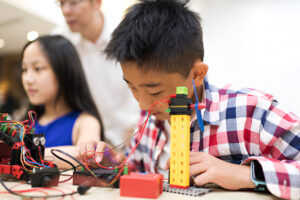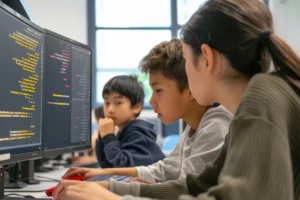
Java is one of the most popular programming languages, and introducing kids to coding with it can open up a world of creativity and problem-solving. This guide will walk through the basics of Java coding, making it fun and accessible for young learners.
By fostering these skills early, children can develop logical thinking, persistence, and an interest in technology that will benefit them in the future. At The Young Maker, we specialize in bringing coding and robotics to life with engaging, hands-on classes tailored for kids, helping them become the creators of tomorrow!
Understanding the Basics of Java
Java is a high-level, object-oriented programming language that is widely used in various applications, from mobile apps to large-scale enterprise systems. Known for its simplicity and readability, Java allows programmers to write code that can run on different devices without needing to be rewritten, thanks to its platform-independent nature.
This “write once, run anywhere” capability makes Java an excellent starting point for beginners, especially kids, as it introduces fundamental coding concepts while offering vast potential for advanced development.
Beyond its versatility, Java is designed with safety and reliability in mind, incorporating features like automatic memory management and a robust security framework. These qualities make Java a preferred choice for developing stable, secure programs. For kids, learning Java opens doors to understanding core programming concepts such as variables, loops, and functions, providing a solid foundation to explore more complex languages and projects in the future.
The Benefits of Learning Java for Kids
Introducing kids to Java coding offers numerous advantages, both in terms of technical skills and cognitive development. Java’s structured and easy-to-read syntax makes it a great language for beginners, helping children grasp essential programming concepts such as logic, problem-solving, and algorithmic thinking. By learning Java, kids develop computational skills that extend beyond coding, fostering creativity and critical thinking that can be applied in various fields, from mathematics to science and engineering.
Additionally, Java is a language used in many real-world applications, from video games to mobile apps and web development, giving kids the chance to create projects they can relate to and enjoy. This practical exposure not only keeps learning engaging but also equips children with skills that are in high demand in today’s tech-driven world. By mastering Java, kids can lay a strong foundation for future programming challenges and even pursue careers in technology.
Essential Java Concepts Every Beginner Should Know
Learning Java introduces kids to a range of important coding concepts that form the foundation of programming. Understanding these key principles will help young learners create more complex and functional programs as they advance in their coding journey. Below, we’ll explore the most fundamental concepts of Java, each crucial for mastering the language.
Variables
Variables are essential in Java, serving as containers for storing data. They allow programmers to hold and manipulate information, such as numbers or text, which can be used throughout a program. Understanding how to declare and use variables is one of the first steps in learning Java, enabling kids to build interactive programs that respond to different inputs.
Loops
Loops are structures that allow a piece of code to be repeated multiple times until a specific condition is met. In Java, loops make it possible to automate repetitive tasks, such as displaying a message or calculating a series of numbers. This concept helps kids understand how computers can perform actions efficiently and save time.
Functions (Methods)
Functions, or methods in Java, are blocks of code designed to perform specific tasks. By using methods, kids can organize their programs more effectively, breaking down complex tasks into manageable pieces. This concept also introduces the idea of code reusability, which is a critical skill in programming as it makes writing and maintaining code easier.
Objects and Classes
Java is an object-oriented language, which means it focuses on using objects—real-world entities like a car or a student—in code. Objects are created from classes, which serve as blueprints for these entities. By learning about objects and classes, kids gain insight into how large, complex programs are structured and designed, giving them a clear path to create more sophisticated applications.
Getting Started with Java: A Step-by-Step Guide
Java is an excellent programming language for beginners, and starting the learning process is both exciting and rewarding. Whether your child is taking their first steps into coding or looking to expand their knowledge, this guide will help them get started with Java in a fun and approachable way. Here’s how to dive into Java coding effectively.
1. Set Up the Development Environment
Before writing any Java code, the first step is to install the necessary software. You’ll need to download and install the Java Development Kit (JDK), which contains the tools required to write, compile, and run Java programs. Additionally, setting up an Integrated Development Environment (IDE) like Eclipse or IntelliJ IDEA makes coding easier by providing a user-friendly interface where students can write and test their code in one place.
2. Learn Basic Syntax
Understanding Java’s syntax is essential for writing functional programs. Beginners should focus on learning how to structure their code with key elements such as variables, operators, and control flow statements like loops and conditionals. These basics will help kids build simple programs and understand how to communicate instructions to the computer. Online tutorials and coding platforms can offer hands-on exercises to reinforce these concepts.
3. Start with Simple Projects
Once the basics are clear, encourage learners to start building simple Java projects. Programs like Hello World, which prints a message on the screen, or basic calculators that perform arithmetic operations, are excellent ways to apply what they’ve learned. These small projects help boost confidence and provide practical experience in coding, making the learning process more enjoyable.
4. Practice Problem-Solving
Java programming is more than just writing code; it’s about solving problems. Encourage kids to take on coding challenges or puzzles that require them to think critically and apply Java concepts in new ways. Websites like Codecademy and Codewars offer engaging problems designed for different skill levels, helping learners strengthen their coding skills while having fun.
5. Explore Object-Oriented Programming (OOP)
As students become comfortable with Java, they can move on to more advanced topics like Object-Oriented Programming (OOP). This programming paradigm is central to Java and involves using objects and classes to model real-world entities. Learning OOP will allow kids to structure larger programs and build more complex applications, opening up a wide range of possibilities in coding.
6. Keep Learning and Experimenting
The journey to mastering Java doesn’t stop after learning the basics. Encourage kids to keep experimenting with new projects, exploring more advanced features like Java libraries and APIs. Joining coding communities or participating in coding competitions can also provide valuable experience and motivate them to continue improving their skills.
Exploring the Real-World Uses of Java
Java is more than just a programming language for beginners; it’s a versatile tool used in a variety of industries and applications. Understanding the practical uses of Java can inspire learners by showing how their coding skills can be applied to real-world problems. Here’s a look at some of the key areas where Java shines:
- Web Development: Java is widely used for building dynamic and scalable web applications. Technologies like JavaServer Pages (JSP) and Servlets enable developers to create interactive websites and online services. Popular platforms like LinkedIn and eBay utilize Java for their backend systems.
- Mobile Apps: Java is the primary language for Android app development. Its robustness and efficiency make it an ideal choice for creating mobile applications that run on millions of Android devices. From games to productivity apps, Java powers a vast range of mobile software.
- Enterprise Solutions: Many large organizations rely on Java for their enterprise applications. Its stability and scalability make it suitable for developing complex systems such as customer relationship management (CRM) software, enterprise resource planning (ERP) systems, and more.
- Embedded Systems: Java’s versatility extends to embedded systems, which are specialized computing systems used in devices like smart appliances, medical equipment, and industrial machines. Java’s portability allows it to be used across different hardware platforms efficiently.
- Big Data Technologies: Java plays a crucial role in handling and analyzing large datasets. Technologies such as Apache Hadoop and Apache Spark leverage Java to process and analyze massive amounts of data, supporting decision-making and data-driven insights in various fields.
By exploring these practical applications, learners can see how Java programming skills can lead to impactful careers and innovative solutions. Whether it’s developing the next popular app or contributing to critical enterprise systems, Java offers a broad spectrum of opportunities for aspiring coders.
Wrapping Up: The Exciting World of Java Coding for Kids
Getting started with Java coding opens a world of possibilities for young learners, providing them with valuable skills that extend beyond programming. By mastering the basics of Java, kids not only learn a versatile and widely-used language but also develop critical thinking and problem-solving abilities that will benefit them throughout their lives. The practical applications of Java, from web and mobile development to big data and embedded systems, illustrate the language’s relevance and potential.
At The Young Maker, we are dedicated to nurturing the next generation of tech enthusiasts through our engaging coding and robotics classes. Our mission is to inspire and equip young minds with the skills they need to thrive in a digital world. For more information about our programs and how to get in touch, please visit our website. Let us help your child embark on their exciting journey into the world of Java programming and beyond!





